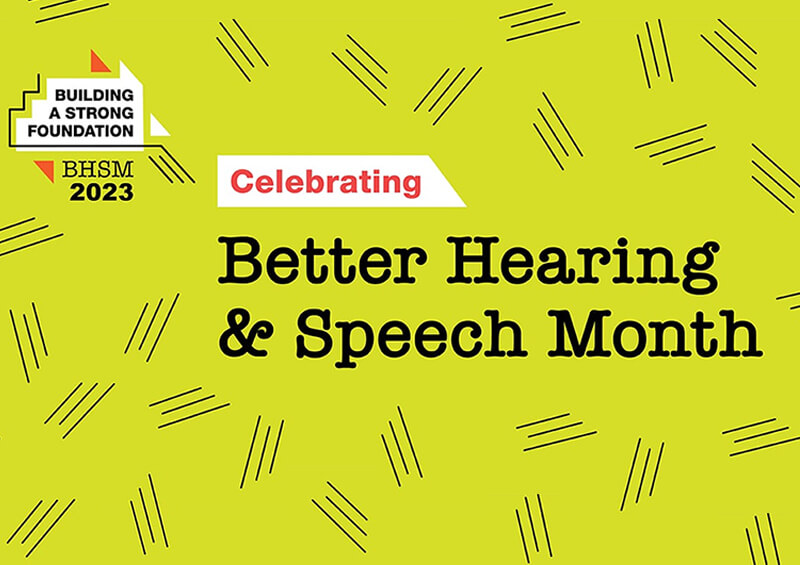20% of the U.S. population has hearing loss in at least one ear, according to a study by the World Health Organization. Though the number sounds staggering, hearing loss affects a vast majority more of our friends, family, and neighbors than many expect.
Yet, as common as hearing loss is, less than 30% of adults over the age of 70 that have hearing loss wear a hearing aid. The percentage for those aged 20-69 is even lower.
May is Better Hearing Month, when hearing care professionals spread awareness about audiology and the importance of healthy hearing. This month, celebrate Better Hearing Month by learning more about your ears and the easy things you can do to protect and care for your hearing.
Our Ears and Sound
Our ears house the 3 smallest bones in our body (the malleus, incus, and stapes), yet they are one of the most powerful organs in our body. From birth, your ears provide your brain with essential information about the world around you. But as time passes, the delicate hair cells in the inner ear can become damaged due to genetics or exposure to loud noises.
However, hearing loss shouldn’t be something you get used to or have to live with—it’s usually treatable. Audiologists help patients struggling with hearing loss regain parts of their life that were once impossible with hearing loss.
How Do I Recognize Hearing Loss?
One of the first signs of hearing loss is that you may have difficulty hearing in noisy environments like restaurants or other public places. You may catch the gist of what is said, but the specifics are hard to understand. People around you might notice that your TV or music is loud and turned up past normal listening levels.
Or maybe, you frequently ask people to repeat themselves, assume others need to speak up, or only hear mumbling when they speak to you. It’s even common to become frustrated with conversations and withdraw from social activities to prevent uncomfortable conversations.
To many, losing your hearing can be scary, but the consequences of untreated hearing loss are scarier. You may notice yourself becoming more reserved and withdrawn or not participating in the things you used to love. More advanced hearing loss can lead to social isolation and, as a result, increase your risk for dementia.
Fortunately, most hearing loss is treatable. Depending on the severity of your hearing loss, hearing aids may be a suitable option to help maximize the sound your ears can still hear. Today’s hearing aids are small and discreet, come in different colors, and pack a ton of technology into tiny receivers.
Preventing Hearing Loss
Preventing hearing loss starts with assessing the activities in your life that may increase your risk. Listening to loud music, attending sports events, watching fireworks, or using power tools can increase your risk of hearing loss. Cell phone apps with a decibel meter can help quickly determine whether sound levels are safe or dangerous.
Permanent hearing damage can occur in mere minutes, so using hearing protection like earplugs in loud environments could be the difference between further damaging your hearing and protecting it.
In addition to preventative action, finding a trusted audiologist to manage and mitigate the risk you’re exposed to is essential to preventing hearing loss later in life. If you already have hearing loss, your audiologist can help reduce your risk and provide treatment options that maximize the hearing you still have.
Better Hearing Is a Call Away
Audiologists are trained hearing care professionals and specialize in treating hearing loss. At the MedRx Hearing Center, Dr. Amanda Kluzynski helps patients every day who struggle with common complaints like being unable to hear their grandchildren’s voices or conversations with their friends and spouses.
Make May the month when you finally prioritize your hearing. As a board-certified Doctor of Audiology, Dr. Kluzynski can help you determine if you have hearing loss and how advanced or mild it may be. You’ll learn what type of hearing loss (if any) you have, and if so, develop a customized treatment plan together.
Better Hearing is a call away! If you suspect your or a loved one’s hearing just isn’t what it used to be, give us a call at (727) 584-9696 to schedule a FREE consultation at the MedRx Hearing Center.
Sources: Take a Stand on Falls | Features | CDC Age-Related Hearing Loss (Presbycusis) — Causes and Treatment (nih.gov) Why hearing loss increases your risk of falling and what to do about it (healthyhearing.com)

